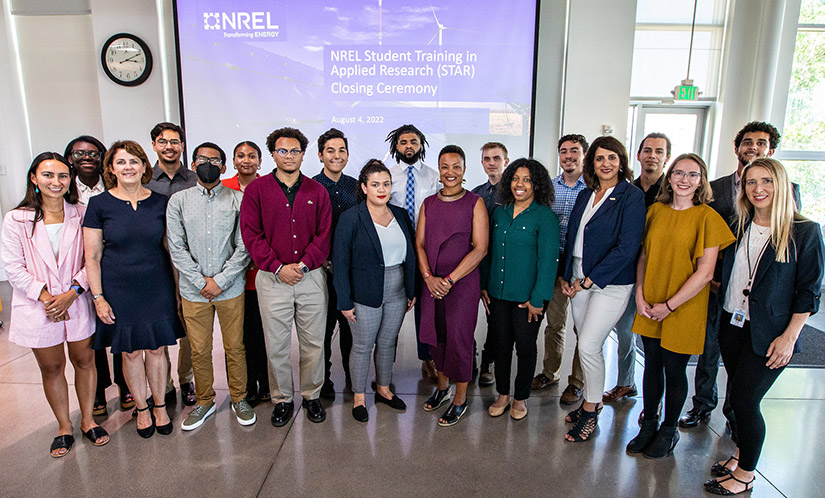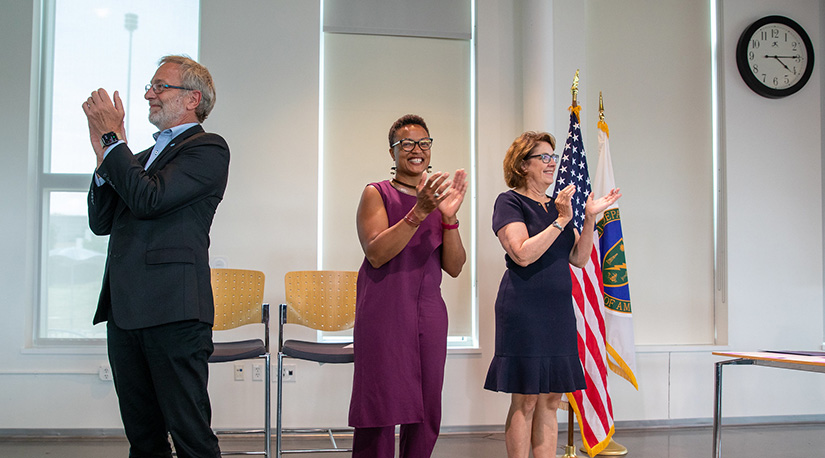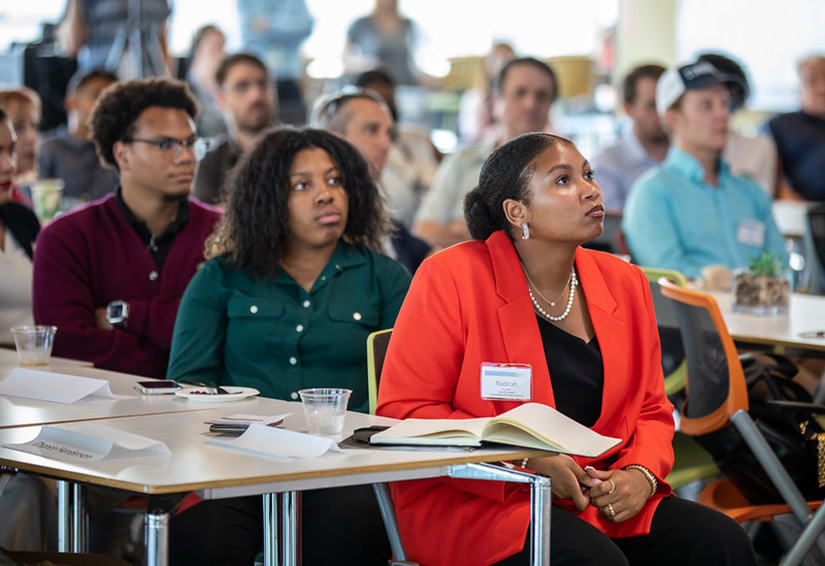NREL Foundation Creates New Opportunities, Enables Nontraditional Funding Sources To Support Research and Initiatives
As a global leader in energy transition technology and the leading U.S. Department of Energy (DOE) laboratory in mobilizing non-DOE partnership funding, the National Renewable Energy Laboratory (NREL) conducts research that many types of organizations want to develop further. That is where the new NREL Foundation comes in: opening new doors and creating room for more organizations to support, create, and grow NREL research and initiatives.

Philanthropic funding plays an important role in protecting vulnerable populations while speeding the clean energy transition. The NREL Foundation enables philanthropists to seed and drive important research and initiatives in partnership with NREL more easily.
The NREL Foundation’s mission is to “support the unique talent at NREL and other organizations to accelerate the development and commercialization of modern energy technologies and solutions that promote electrification, decarbonization, and clean air.” And although the NREL Foundation includes NREL in its name and mission, the foundation is a separate, board-governed entity that is not controlled by or attached to NREL or the Alliance for Sustainable Energy—NREL’s manager and operator. Nobody on the foundation board is employed by NREL. In fact, NREL treats this foundation the same as it would any other partner, but what the NREL Foundation is able to do is serve as a kind of translator—a middleman—legally accepting private donations and turning that money into meaningful work at the laboratory.
Operationally, the NREL Foundation accepts donations the same way any other charity would. The website has a payment link for donors. When larger organizations and other foundations donate funds, NREL Foundation Executive Director Kristin Gray—the foundation’s only employee—works with her counterparts at the donor organizations to bring in the money. Once the money is in, Gray negotiates contracts with NREL to aggregate donated funds and execute programmatic work. The foundation has no single sponsor, and no philanthropists or sponsors are actively controlling work at the laboratory.
The NREL Foundation—a 501(c)(3) nonprofit organization—was approved by the IRS in December 2021 and has been operational for a little more than two years, but the idea to develop a foundation and the first movement toward that end took place nearly a half-decade ago.
“Close to five years ago, Martin [Keller, NREL director] made a formal request of the Department of Energy to set up a foundation,” Associate Laboratory Directory for Innovation, Partnering, and Outreach Bill Farris said. “It was a nonstandard request they had to approve. We made sure we talked it through with DOE and they were in full support of it.”

Despite the lack of a formal association, NREL wanted people to know this foundation would make use of donations primarily to support NREL research and activities. Because the name NREL is a wordmark that is U.S. government owned and operated, the vetting and approval process stretched out longer than usual. According to Farris, at one point early on, those close to the development referred to it as the Low Carbon Energy Foundation.
The incorporation of the NREL Foundation in March 2021 accomplished more than just creating avenues for NREL to indirectly partner with nontraditional funders. It prompted DOE to firm up the process. NREL suggested the rationale and operating concepts for laboratory-affiliated foundations to senior DOE officials. Managing conflicts of interest and transparency for DOE were important features of the road map.
“It caused DOE to write a policy memo on how any laboratory can set up a foundation to do similar things at their laboratories,” Farris said. “That road map didn’t exist until we made that request of DOE.”
Highlighting an NREL Foundation Grantee: The NREL STAR Undergraduate Internship Program
In its first full year, 2022, the NREL Foundation translated $5.8 million private dollars into NREL work. Two especially noteworthy applications of NREL Foundation donations were the seed money for the Net Zero World Initiative and the seed funding for the inaugural year of the Student Training in Applied Research (STAR) undergraduate internship program for students at minority-serving institutions that was designed and launched by NREL’s University Partnerships Program.
“The University Partnerships Program is building a portfolio of strategic connections with universities, including R1 universities—the top research institutions across the country—as well as with minority-serving institutions,” said Ellen Morris, University Partnerships Program director at NREL. “There is an excellent opportunity to build a bridge to minority-serving institutions that offer talent and perspectives that tend to be overlooked. We are working to build awareness at NREL of these schools and help create intentional and trusted engagement.”
At the highest level, the STAR program creates opportunities for selected students from minority-serving institutions to travel to, live near, and work side by side with NREL researchers and their university faculty advisors on applied and basic research in clean energy. The program also provides the students with many other benefits, including a leadership course through Outward Bound and the opportunity to network not only with other students from their schools but also those from other schools.
What makes the STAR program unique is that this internship provides a more guided experience in research, so students can gain hands-on experience early on in their academic careers that will hopefully set them up for success in their careers. The STAR program also creates meaningful, long-term partnerships with minority-serving institutions for expanded research opportunities across NREL.

STAR is a unique cohort-based program that is centered on a 10-week summer research experience for the student with an NREL scientist. It also provides support for a faculty advisor who mentors the student throughout the subsequent academic year while maintaining communication with the NREL researcher. The program is geared for students between their second and third year of their education in a STEM field, aligned with NREL’s research interests. Students work at one of NREL’s three campuses—Golden or Boulder in Colorado or NREL’s Alaska campus in Fairbanks. STAR offers tailored professional development, in part through the Outward Bound leadership course, but also through several cohort-building activities, to bolster confidence and leadership skills while strengthening inter- and intraschool relationships.
NREL and the Wells Fargo Foundation
Longtime NREL partner and funder of the Wells Fargo Innovation Incubator (IN2), the Wells Fargo Foundation, provided funding to the NREL Foundation to implement the pilot year of STAR—a decision made easier thanks to NREL’s long-standing relationship with the Wells Fargo Foundation.
“The strong ties we’ve established with NREL through the IN2 program allowed us to easily expand our relationship,” said John Moon, Wells Fargo senior vice president and sustainability philanthropy leader.
Moon said the relationships Wells Fargo had with NREL through IN2 helped them think through how the STAR program could look, with an openness to include and expand a focus on diversity, equity, and inclusion.
“We discussed ways to enhance the diversity, equity, and inclusion elements within the STAR program,” Moon said, “including a capstone event where interns can share their unique perspectives with the NREL community to broaden understanding and perspectives of underserved communities related to viewpoints on climate change. Additionally, feedback could be used to enhance the STAR program as a whole.”
The Wells Fargo Foundation funded housing for the students at nearby Colorado School of Mines, which allowed them to have access to the broader goal of the program—to gain experience working side by side with NREL researchers and advisors.
“Without Wells Fargo’s help, we couldn’t have started it,” Morris said. “NREL couldn’t fund the housing piece and definitely could not have funded the leadership program elements. These students reported breakthroughs that they said would otherwise never have happened. They were able to interact with colleagues in a much more meaningful way, and the Wells Fargo support was huge in that respect.”
Students gave the STAR program, now entering its second round, glowing reviews. Looking to build on the first cohort’s successes, program administrators are already considering potential upgrades and future expansions.
Learn more about the STAR program, the NREL-administered and Wells Fargo Foundation-funded IN2 program, and the NREL Foundation.

